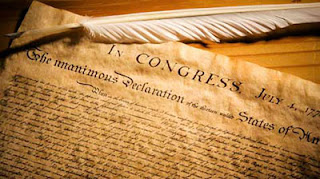The Course of Human Events
It is easy, looking back, to gloss over just how remarkable was the sequence of events that made this nation’s independence a reality. The bickering and machinations of the Continental Congress in 1776 were every bit as unpleasant, and unproductive, as the worst of today’s elected officials — even though, and perhaps in some measure because, hostilities with Great Britain had officially been underway since the so-called “shot heard ‘round the world” the preceding spring.
The men who gathered in Philadelphia that summer to bring together what was not yet a “new nation” came from all walks of life. Still, it seems fair to say that most had something to lose, both financially and in terms of the personal liberty they advocated as an “unalienable” right. True, many were merchants (some wealthy, including President of Congress John Hancock) already chafing under the tax burdens imposed by British rule, and perhaps they could see a day when their actions would accrue to their economic benefit. But they could hardly have undertaken that declaration of independence without a very real concern that they might well have signed their death warrants.
Ironically, despite the celebrations on the 4th, the resolution that declared that “these United Colonies are, and of right, ought to be, Free and Independent States” was approved by the Continental Congress on July 2. In fact, only President of Congress John Hancock and Charles Thomson, secretary, signed it on the 4th (the former famously in a hand “large enough for King George to read without his spectacles”). Most of the 56 delegates didn’t sign it for another month. One didn’t sign until 1781.
Of course, that “declaration” didn’t magically make it so. The winter at Valley Forge and many other disappointments still lay ahead. The surrender of Cornwallis at Yorktown was still more than five years off, and an official end to the hostilities would not come until two years after that, in 1783.
This week most will commemorate the declaration of this nation’s independence as a unifying experience. And yet, just “four score and seven years” later, as the nation approached another Independence Day celebration, President Abraham Lincoln would find himself in the middle of an enormously unpopular war fought to keep the nation together, even as two massive armies converged at a crossroads community called Gettysburg.
Even in 1776, historians have suggested that only about a third of the colonial citizenry actually favored independence, while a third remained loyal to Britain — and the remainder apparently just wanted to be left alone.
It seems only right then that today, as part of this “course of human events” and perhaps particularly at this time when our nation seems so deeply divided on a number of issues, that we remember not only the differences, but the sacrifices, large and small, that have made this great nation possible.
- Nevin E. Adams, JD
You can read more about the Declaration of Independence here.
The men who gathered in Philadelphia that summer to bring together what was not yet a “new nation” came from all walks of life. Still, it seems fair to say that most had something to lose, both financially and in terms of the personal liberty they advocated as an “unalienable” right. True, many were merchants (some wealthy, including President of Congress John Hancock) already chafing under the tax burdens imposed by British rule, and perhaps they could see a day when their actions would accrue to their economic benefit. But they could hardly have undertaken that declaration of independence without a very real concern that they might well have signed their death warrants.
Ironically, despite the celebrations on the 4th, the resolution that declared that “these United Colonies are, and of right, ought to be, Free and Independent States” was approved by the Continental Congress on July 2. In fact, only President of Congress John Hancock and Charles Thomson, secretary, signed it on the 4th (the former famously in a hand “large enough for King George to read without his spectacles”). Most of the 56 delegates didn’t sign it for another month. One didn’t sign until 1781.
Of course, that “declaration” didn’t magically make it so. The winter at Valley Forge and many other disappointments still lay ahead. The surrender of Cornwallis at Yorktown was still more than five years off, and an official end to the hostilities would not come until two years after that, in 1783.
This week most will commemorate the declaration of this nation’s independence as a unifying experience. And yet, just “four score and seven years” later, as the nation approached another Independence Day celebration, President Abraham Lincoln would find himself in the middle of an enormously unpopular war fought to keep the nation together, even as two massive armies converged at a crossroads community called Gettysburg.
Even in 1776, historians have suggested that only about a third of the colonial citizenry actually favored independence, while a third remained loyal to Britain — and the remainder apparently just wanted to be left alone.
It seems only right then that today, as part of this “course of human events” and perhaps particularly at this time when our nation seems so deeply divided on a number of issues, that we remember not only the differences, but the sacrifices, large and small, that have made this great nation possible.
- Nevin E. Adams, JD
You can read more about the Declaration of Independence here.




Comments
Post a Comment